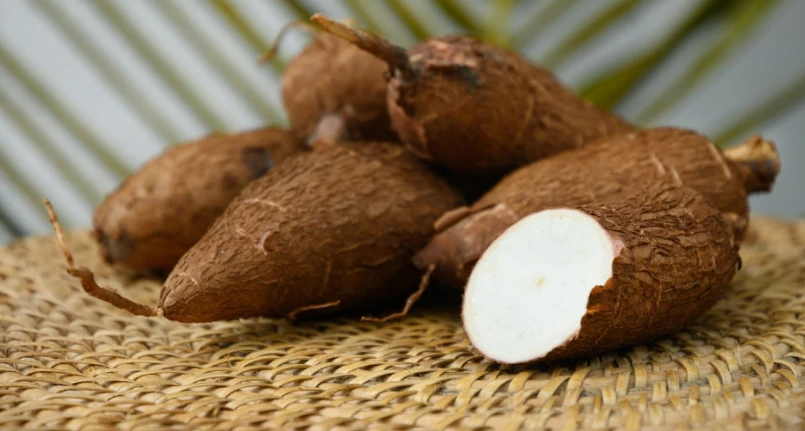Yuca is a root native to Brazil, also known by the term cassava . Cultivated in all tropical regions of the world, it is divided into two types : a more common one with a bitter taste , and a second one which is sweet .
The most typical use of Yuca or Manioc is its transformation into a flour which takes the name of Topioca, but it can be consumed in many other ways , as long as it is cooked. In fact, Yuca root contains a poisonous acid that is destroyed only during the cooking process .
Nutritional properties
- One cup of yuca root equals a single serving and contains the following amounts of elements.
- Calories : 213
- Total fat: 0.4 g
- Cholesterol : 0 mg
- Sodium : 326 mg
- Total Carbs: 50.5g
- Dietary fiber : 2.4 g
- Sugar : 2.3 g
- Added sugar : 0 g
- Proteins : 1.8 g
- Vitamin C : 20% of the Daily Value (DV)
- Copper : 14% HD
- Thiamine (B1): 8% DV
- Potassium : 7% HD
- Magnesium : 6% DV
- Niacin ( B3 ): 6% DV
- Vitamin B6 : 6% DV
- Folate (B9): 6% DV
- Riboflavin (B2): 4% DV
- Zinc : 4% DV
- Phosphorus : 3% HD
Benefits
Excellent for intestinal health
Yuca or cassava root contains resistant starch , a type of carbohydrate that resists digestion in the small intestine and ferments in the large intestine , acting as a prebiotic to nourish healthy bacteria in the intestines .
Because resistant starch isn’t digested in the small intestine, it doesn’t raise blood glucose levels . It also causes less gas than other fibers because it’s fermented slowly and can help you feel full, treat and prevent constipation, and lower cholesterol .
When resistant starch undergoes fermentation in the colon , it causes the production of short-chain fatty acids , which play an important role in gut health , including reducing inflammation and supporting intestinal barrier function .
Ideal for a gluten free diet
If you are gluten intolerant or simply decide to follow a grain or gluten free diet , yuca can be a nutritious addition to your meals, as it lacks this element.
Furthermore, it is a wholemeal food , a panacea for health at three hundred and sixty degrees.
Supports heart health
Like other vegetables or foods , Yuca or Cassava can be chosen as part of a diet designed for those with heart problems or who want to protect it specifically.
In fact, each serving provides 2.4 grams of fiber that has the ability to lower bad cholesterol .
The recommended daily amount of fiber is between 25 and 38 grams, and according to an analysis published in 2017 in the Journal of Chiropractic Medicine, people who eat large amounts of it appear to significantly reduce their risk of death from heart disease .
Fiber can also reduce blood pressure and the chances of inflammation . They also help control blood sugar levels in people with diabetes .
A serving of yuca also provides 7% DV of potassium , generating positive chain reactions. Eating more potassium causes more sodium to be lost through the urine and decreases the tension in the blood pressure walls. As a result, it can help you manage high blood pressure .
Yuca is also a food rich in vitamin C , which in addition to potentially improving heart health, being one of the most important antioxidants in existence protects cells from damage.
Health risks
The only real risk of consuming Yuca may be developing a secondary allergic reaction . In fact, some latex allergy sufferers may also experience cross-reactivity with cassava. This cross-reactivity occurs when the proteins of one substance are similar to those of another, and therefore cause a similar reaction.
If you suspect you have an allergy of this type, talk to your doctor or an allergist before consuming Yuca, in any form.
How to consume it
Yuca lends itself to various uses in the kitchen. For example, it can be used in place of other vegetables or transformed into Topioca and therefore in the form of flour, a base for bread and other bakery products . Both for its taste and for its texture, it is particularly suitable as an alternative to potatoes .
In addition to cooking Yuca thoroughly before eating it, to remove harmful toxins , it’s important to store it properly .
If you plan to use it within a week, it may be sufficient to keep it in a cool, dark and dry place. Alternatively, peeled Yuca can be stored in water in the refrigerator for a month if you replace the water every two days, or in the freezer for several months.
Yuca root alternatives
If you want to prepare a root-based meal but don’t like cassava, or want to integrate it with something else, the best alternatives are beets, parsnips , sweet potatoes and turnips .




